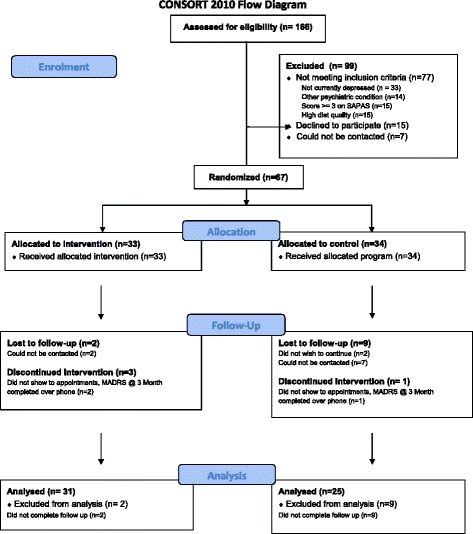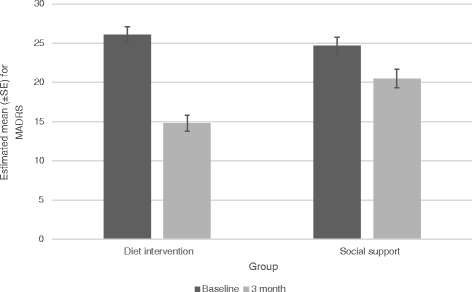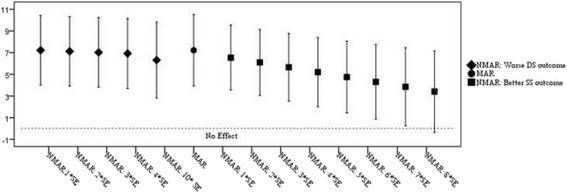A randomised controlled trial of dietary improvement for adults with major depression (the 'SMILES' trial)
- PMID: 28137247
- PMCID: PMC5282719
- DOI: 10.1186/s12916-017-0791-y
A randomised controlled trial of dietary improvement for adults with major depression (the 'SMILES' trial)
Erratum in
-
Correction to: A randomised controlled trial of dietary improvement for adults with major depression (the 'SMILES' trial).BMC Med. 2018 Dec 28;16(1):236. doi: 10.1186/s12916-018-1220-6. BMC Med. 2018. PMID: 30591046 Free PMC article.
Abstract
Background: The possible therapeutic impact of dietary changes on existing mental illness is largely unknown. Using a randomised controlled trial design, we aimed to investigate the efficacy of a dietary improvement program for the treatment of major depressive episodes.
Methods: 'SMILES' was a 12-week, parallel-group, single blind, randomised controlled trial of an adjunctive dietary intervention in the treatment of moderate to severe depression. The intervention consisted of seven individual nutritional consulting sessions delivered by a clinical dietician. The control condition comprised a social support protocol to the same visit schedule and length. Depression symptomatology was the primary endpoint, assessed using the Montgomery-Åsberg Depression Rating Scale (MADRS) at 12 weeks. Secondary outcomes included remission and change of symptoms, mood and anxiety. Analyses utilised a likelihood-based mixed-effects model repeated measures (MMRM) approach. The robustness of estimates was investigated through sensitivity analyses.
Results: We assessed 166 individuals for eligibility, of whom 67 were enrolled (diet intervention, n = 33; control, n = 34). Of these, 55 were utilising some form of therapy: 21 were using psychotherapy and pharmacotherapy combined; 9 were using exclusively psychotherapy; and 25 were using only pharmacotherapy. There were 31 in the diet support group and 25 in the social support control group who had complete data at 12 weeks. The dietary support group demonstrated significantly greater improvement between baseline and 12 weeks on the MADRS than the social support control group, t(60.7) = 4.38, p < 0.001, Cohen's d = -1.16. Remission, defined as a MADRS score <10, was achieved for 32.3% (n = 10) and 8.0% (n = 2) of the intervention and control groups, respectively (χ 2 (1) = 4.84, p = 0.028); number needed to treat (NNT) based on remission scores was 4.1 (95% CI of NNT 2.3-27.8). A sensitivity analysis, testing departures from the missing at random (MAR) assumption for dropouts, indicated that the impact of the intervention was robust to violations of MAR assumptions.
Conclusions: These results indicate that dietary improvement may provide an efficacious and accessible treatment strategy for the management of this highly prevalent mental disorder, the benefits of which could extend to the management of common co-morbidities.
Trial registration: Australia and New Zealand Clinical Trials Register (ANZCTR): ACTRN12612000251820 . Registered on 29 February 2012.
Keywords: Depression; Diet; Dietetics; Major depressive disorder; Nutrition; Randomised controlled trial.
Figures



Comment in
-
The SMILES trial: an important first step.BMC Med. 2018 Dec 28;16(1):237. doi: 10.1186/s12916-018-1228-y. BMC Med. 2018. PMID: 30591059 Free PMC article.
-
The SMILES trial: do undisclosed recruitment practices explain the remarkably large effect?BMC Med. 2018 Dec 28;16(1):243. doi: 10.1186/s12916-018-1221-5. BMC Med. 2018. PMID: 30591065 Free PMC article.
References
Publication types
MeSH terms
Grants and funding
LinkOut - more resources
Full Text Sources
Other Literature Sources

